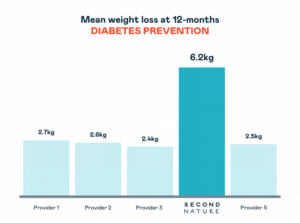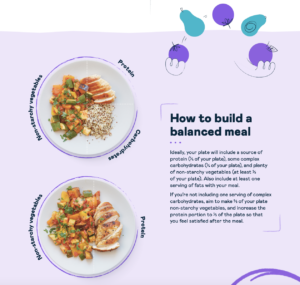Myth Busting
Detox diets

Medication-assisted weight loss with a future focus
Start with Mounjaro, transition to habit-based health with our support

Myth: ‘Detox diets are a good way to promote health, rid our bodies of ‘toxins’, and lose weight’
Detox diets: The bottom line
- While reducing your intake of ultra-processed foods and eating a healthy diet can improve your health, there’s no scientific evidence that extreme detox diets work in the short or long-term.
- Companies take advantage of people desperate for a quick fix by selling detox cleanses, juices, or supplements.
- Detox diets often include extreme forms of crash dieting practices like cutting out entire food groups, fasting, or juice cleanses.
- You’ll probably lose weight in the short-term as you drastically cut your energy intake, but this doesn’t mean you’ll be healthier in the long run.
- The idea that these diets remove toxins from your body doesn’t have any grounding in science. Your liver and kidneys filter blood and do this job for you, regardless of what you’re eating.
- Rather than focusing on extreme detox diets, reflect on the bigger picture and follow evidence-based approaches, like Second Nature.
What are detox diets?
It’s hard to escape advertisements for detox diets, especially following periods of indulgence like Christmas or in preparation for the summer holidays.
These detox plans are so popular because people are often desperate for a quick fix, and companies are ready to exploit this commercially.
These diets are often advertised as a quick-and-simple way to achieve several goals, such as weight loss, improved digestion, increased energy levels, boosted immune system, and even cellulite reduction.
Rather than focusing on healthy eating, they tend to involve a highly restrictive diet for a short period of time. This could include:
- Fasting.
- Only eating fruits and vegetables.
- Only consuming liquids.
- Taking herbal supplements or laxatives.
- Cutting out food groups.
- Eliminating alcohol or caffeine.
It’s worth noting that there is a difference between making healthy changes and going on a detox diet.
For example, reducing our intake of ultra-processed foods, such as crisps, biscuits, or cakes, will always benefit our health.
However, there’s little scientific evidence that an extreme detox diet positively impacts our health in the short or long term.
Do detox diets work?
Weight loss
It’s not that these diets don’t work for weight loss. They will work. However, we’d strongly argue that they are the wrong way of losing weight. Plus, the weight you lose won’t stay off.
You’ll most likely experience short-term weight loss with any strict detox diet.
The main reasons for this are:
- You’ll be consuming a lower amount of total calories. Your body will also go into fasting mode for extended periods of the day.
- You’re reducing your intake of high-calorie foods with little nutritional value, such as ultra-processed foods and alcohol.
While they may result in rapid weight loss in the short term, these diets aren’t helpful when we look at the bigger picture of long-term health. Arguably, the biggest problem with extended detox diets is that you lose muscle mass.
The lack of protein contained in fruit and vegetable juices will cause your muscles to waste away. So, while you’ve lost overall weight (which appears good on the surface), you’ve also lost muscle mass (which isn’t a good thing).
This will reduce your longer-term metabolism, meaning that you will burn fewer calories at rest.
The goal of weight loss is to reduce body fat while maintaining muscle levels. This is achieved by ensuring you are consuming a portion of protein at main meals and doing various resistance exercises.
So, in theory, detox diets will result in short-term weight loss, which isn’t sustained in the long term, and will reduce our muscle mass. But what does the science say?
A review published by the British Association for Dietetics highlighted that no clinical evidence supports the effectiveness of detox diets for long-term weight loss.
However, data suggests that when we dramatically reduce our energy intake (as we would with a detox diet), our body adapts to try and conserve energy.
As a result, we experience a compensatory increase in appetite and a decrease in energy expenditure. This often leads to a plateau in weight loss after the initial short-term weight loss, and even subsequent weight gain when we return to normal eating patterns.
Key points:
- Detox diets are normally very restrictive and will usually result in short-term weight loss.
- Detox diets lack protein, which leads to a reduction in muscle mass.
- In the long-term, the loss of muscle combined with the compensatory increase in appetite and decrease in energy expenditure will most likely lead to a weight loss plateau or even weight gain.
Removing ‘toxins’ from the body
No scientific evidence supports the need for a detox diet to eliminate ‘toxins’. This idea isn’t logical and doesn’t make biological sense.
The human body has very complex systems that take care of any detoxing needed. These include the kidneys, liver, digestive system, immune system, lungs, and skin.
If toxins were left floating around our body that wasn’t being removed by these systems, we’d feel extraordinarily unwell and most likely be hospitalised.
On top of this, the term ‘toxin’ is regularly used but poorly defined. Many diets claim to ‘rid your body of toxins’, but they don’t name what these toxins are or why detox diets get rid of them.
Conventionally, ‘toxins’ relate to drugs or alcohol in the medical world. However, in the commercial world, anything can be called a ‘toxin’, making exploring specific claims challenging.
Ironically, if we take several herbal supplements and/or fast for an extended period of time, it can end up damaging our health.
With very little evidence behind and definition around detox diets, we can’t say that any particular one that promotes supplementation is safe in the long term.
Key points:
- The idea that our body needs help removing ‘toxins’ makes no biological sense.
- The term ‘toxin’ is used often in commercial diets but poorly defined.
- Supplementation, even of herbal remedies, can be dangerous.
More reasons to question detox cleanses
- Detox diets set you up with the wrong attitudes and behaviours about weight loss. Living an unhealthy lifestyle for most of the year and then trying to fix this with spontaneous detox diets isn’t a healthy or sustainable approach.
- If you buy detox diets from a company, they are expensive. You are unnecessarily wasting your money, especially considering there’s no strong evidence they work or do anything.
- Maintaining a balanced and varied diet ensures you won’t be deficient in vitamins. Doing a detox diet is unnecessary because you are loading up on vitamins. Water-soluble vitamins are excreted in the urine when consumed excessively, and increasing your intake won’t provide any additional health benefits.
- If you’re hugely restricting your calorie intake for a short period of time (a few days or a week), you’ll likely feel weak, irritable, and low on energy. This doesn’t seem worthwhile if there’s no evidence for benefits.
Alternatives to detox diets
If you’re looking to improve your health, lose weight, or increase your energy levels, the best way to do this is to focus on eating varied, healthy, satisfying meals.
Our diet plan guide shows an example of how to build healthy meals and a 7-day diet plan.
A lower carbohydrate diet based on whole foods can also help promote weight loss and reduce our chances of developing lifestyle diseases.
Overall, eating a balanced, lower carbohydrate diet is more likely to result in long-term, sustainable weight loss than any detox diet.
You also won’t feel weak or irritable if you’re eating healthily rather than restricting your body’s energy intake.
Second Nature’s approach: Indulgent but supports weight loss
In 2022, the NHS published data in the British Medical Journal from the National Weight Management and Diabetes Prevention programme, where five providers delivered weight loss services in the UK.
The results showed that after 12 months, Second Nature was more than twice as effective as the four other providers.

How does Second Nature’s approach work?
We approach nutrition and healthy eating differently. We don’t count calories, track macros, weigh food, or assign strict targets on your intake.
We provide you with evidence-based guidance on a balanced diet and teach you to understand what your physical and emotional drivers for eating are to reach your weight loss goals.
We also provide tools, such as our hunger scale and mindful eating techniques, that help you tune into your physical hunger cues and manage your food choices.
Alongside this, we help you build healthy habits that you can enjoy for a lifetime to help you maintain a healthy weight.
Our feedback inbox is filled with people like Jo, who lost over eight stone to achieve a healthy body weight on Second Nature after following our nutrition guidelines and receiving the support of our app and health coaches.
The difference is that members of Second Nature learn to love food again. They’re no longer restricted. They’re liberated.

If you’d like to join over 150,000 others who’ve joined Second Nature, lost weight and kept it off, then click here to take our health quiz.
Take home message
- Detox diets promote reducing/eliminating ultra-processed foods as well as alcohol for a period of time, which is obviously a healthy move.
- No scientific research supports the notion of ‘cleansing’ your body of ‘toxins’.
- ‘Toxins’ are very poorly defined, making it challenging to make any concrete conclusions about the benefits of detox diets.
- You can reduce unhealthy, processed foods without going to the extreme of a detox diet.
- Focusing on building healthy, balanced meals and following a satisfying, lower-carb diet will result in more long-term weight loss and improvement in health compared with a detox diet.
Medication-assisted weight loss with a future focus
Start with Mounjaro, transition to habit-based health with our support


Download our free, indulgent 7-day meal plan
It includes expert advice from our team of registered dietitians to make losing weight feel easier. Subscribe to our newsletter to get access today.
You might also like
Carol
29 February, 2020
Interested in learning about your programme. I’m over 20st in weight and would like to maintain a healthy weight of at least 12 stone. I’m pre diabetic, high blood pressure and high cholestrol. Would like to get motivated, help, coaching if possible and learn the right and correct way to follow a diet plan to help me succeed in being healthy again. Thanks
MAUREEN
27 July, 2019
Very educational therefore helpful Thankyou
As seen on
As seen on
